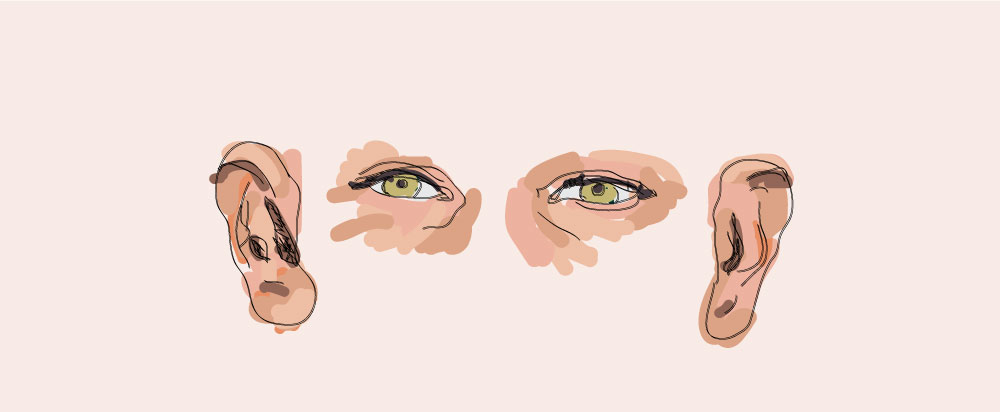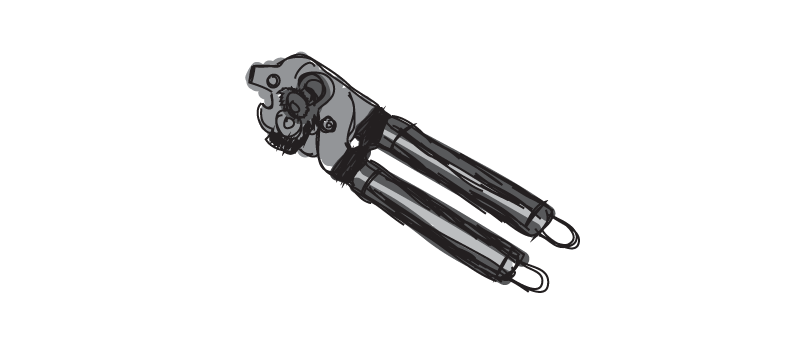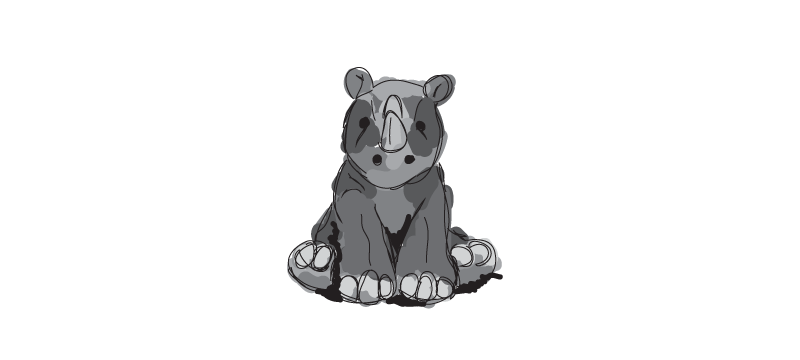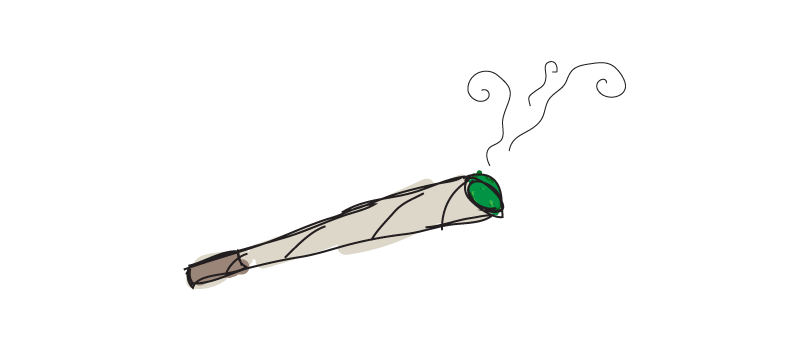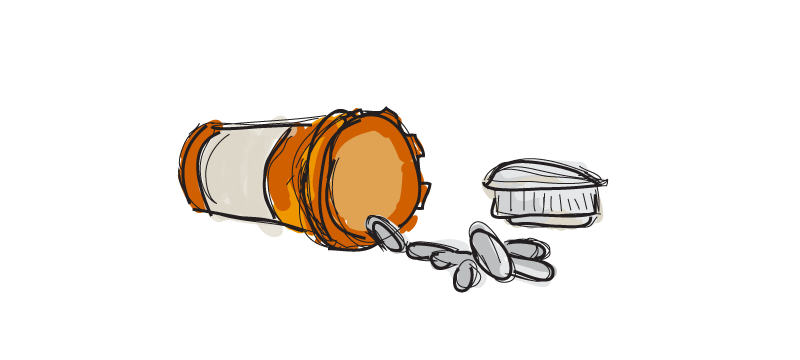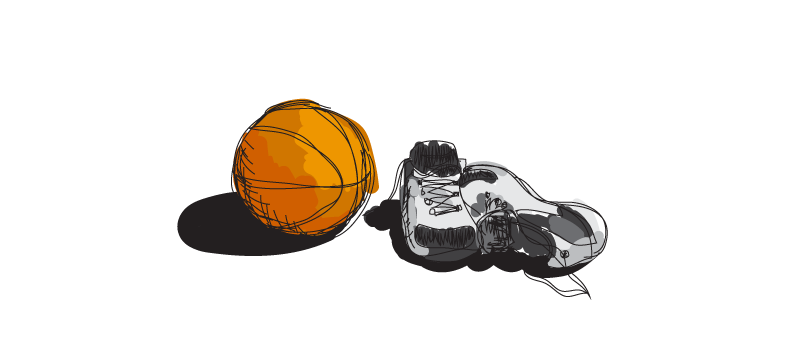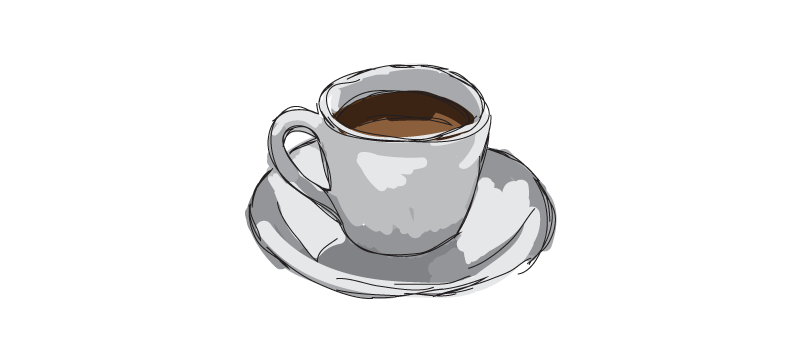As a writer, I’m only anything if observant. And yet I have frightening blind spots. Despite the low square footage of my Harlem apartment, too often I can’t find things in it. Clothes, shoes, the remote. Even the can opener, which has only one place of keeping, the utensils drawer, which I search through and swear doesn’t contain the utensil it inevitably must. On the other hand, things I can find easily — and know I can find easily — I waste my time finding (my wallet, keys, and phone), a vestige of my childhood compulsions.
Such as knowing the location of my security animals. As a child I had a stuffed Tigger which I brought on sleepovers and errands with my mother. Around the third grade I added a rhinoceros named Rhino.
The night I couldn’t find Rhino, we were shacked up in a transitional apartment; we were moving about an hour away from where I had great friends and awesome sports teams and a sense of home. I wasn’t inconsolable, but unconsciously desperate. Searching not my room, but some proxy box-with-bed, I felt poles of sick hope and futility pulling from each end of me, with the magnetic force of an ultimatum I hadn’t agreed to. Too young to question the imperative of Rhino’s presence, my dread that he was still missing bemused me. Childhood is rife with navigating conflicting feelings. Most of the time, that’s when you called for Mom.
I don’t recall everything that happened after I asked her to help me look. I do remember that it was relatively late on a school night, and that this antecedent fact would already put me in a hole. I remember her gesticulating, Did you look? This is asked merely by circling a cupped hand about the eye, her raised brow turning the signed phrase into a question.
Yes, I nodded my fist sheepishly.
Where did you last see it? she signed, an index finger wiping imaginary windows.
“Then I’d know where it is!” I pleaded aloud.
“Brian, you need to learn to look for things!” she burst, then started for my box.
My mother was navigating some conflicting feelings herself. She’d just pushed for a move that, with hindsight, would only drag her depression along with her. Tonight was the first of dozens of nights in which I’d see her dissolve before the terrible black monolith I’d eventually become acquainted with. Her curt investigative questions turned quickly into flailing conniption. Soon enough, I was watching her throw blankets and clothes from the floor and bed in a show of how terrible her help was making her feel. Her hearing aid began to whistle, cartoonishly denoting her anger. Her face was flushed and I was frightened. She screamed that it was late, that I was irresponsible, that I’d never be able to hold down a job, then turned back to her tossing so that, should I respond, my words would batter uselessly against nothing but her ears’ high bleating whistle. Ten years later, I’d retaliate, using words far worse than these, and far more often. That this anger would coincide with the veiled awareness of her unconditional love and devotion was just another iteration of conflicting feelings.
Within a year after the move, my mother wanted to return. She’d failed to find happiness an hour away, where there was a stronger Deaf community, where we were closer to my parents’ office. Now, she missed her best friend. Or maybe the Montgomery County folks were too uppity and cold. Or maybe the new house was too dark, not enough Vitamin D, which she had to pair with calcium, and stay away from gluten, and refrain from exacerbating her CFS, or else happiness could never be synthesized. The list of spiritual antigens grew past my ability to keep track. She was desperate to find happiness wherever she decided it might be. Years later, my search would be similar.
It seems to me now that my process of finding has been short-circuited, frayed out from purpose. My desperation is for the comedy of an unseen audience — indeed, my frustrations can get quite slapstick when I can’t find the can opener, and the compulsion to locate my wallet, keys, and phone before I’m to sit down and enjoy a movie is only more absurd. However, what we all come to find is that our chronic searching is far from anything material; thus it was only natural that my pilgrimage, four times a week, to an 11th-floor office building on 22nd and Broadway, would lack anything resembling an efficient route.
•
Circa 1975, it was practically in vogue to mention one’s analyst, usually in cheeky reference to one’s maladaptive patterns. Alas, this retrofitted meme didn’t quite make it to the digital age. Somewhere between then and now, the Freudian practice has been crowded by a proliferation of therapeutic methods, which have jostled psychoanalysis from the beau monde’s embrace as though it was the gross projection of Woody Allen himself. Now, for better or worse, nu-therapies such as mindfulness have swept the scene, and I’m forced to explain to people exactly what psychoanalysis is, or what it’s like, and why I should take an evolving combination of trains to 22nd and Broadway, where I speak with exhausting candidness to a doctor barely my senior.
For more than ten years I smoked marijuana like it was methadone for worryoids; I abused the dosage until I was just relapsing on a different type of worry (paranoia, gastric regret, etc.). I didn’t drink daily, but when I did I managed to impress myself. Roughly twice a week I popped capsules of Kratom, an Indonesian herb that acts as alkaloid agonist (which is quite like an opioid and, coincidentally, is often used by opioid addicts as an alternative to methadone or other maintenance treatments). I did other drugs, with dwindling frequency, though still riskily; the second-to-last time I bought cocaine, I first opened the wrong car door (“This ain’t a fuckin’ cab”), only to find my dealer in the other black coupe nigh 20 feet farther down El Barrio’s avenue. After I got in, he revved around the corner onto 110th, and I watched him unlatch the secret pharmacy architected into his dash, bugged eyes darting at all angles of pursuit. Despite the cop cars right around the corner on third, I proceeded to purchase one single gram of blow. I walked away without having earned my fourth arrest, swearing that was the last time. You know the rest.
That story isn’t a new one, the story about substance abuse and delinquency, the double-life of the privileged. (I’m only a contributing member of society today because I could afford lawyers yesterday.) But this story doesn’t only tell about the sequelae, about searching for and finding all the symptoms; it speaks to the illness itself, following an etiology that’s comprised of my very conscious experience.
•
My analyst’s high office is an unnamed polygon, all chamfered at the corners, as though otherwise I’d be prone to gouge my head on the nearest sharp angle. The consultation consists of questions posed in the C-SPAN tone of a government probe. I tell myself that this is not therapy; this is the shrewd business of real healing. But in the back of my mind I know my inner drill sergeant will wither under the frustration of searching for the enemy and failing to find it.
We agree that I will stop ingesting drugs. “Particularly marijuana,” he adds.
I cock my head. “How can I particularly stay away from anything if I’m absolutely staying away from it all?”
It’s the first time he employs silence. We haven’t even discussed payment and, already, through a neutral gaze, he’s eliciting tacit questions: Why would I narrow his meaning, implying that only I can configure anagrams of significance? How selfish and petty of me. How dare this nebbish spindle of human flesh. Don’t these quacks know when to separate a joke as pure content removed from process? If not — if my every word is to be relevant — I’ll have to emulsify myself to keep this visceral heat from rising to my head.
At the end of the consultation we agree on $35 a session. I have misgivings about my healer, half because of his tacit riddle and half because his discount betrays he’s still a trainee. I feel I’m but a rodent on which to practice, but $35 is particularly cheap when compared to my other options.
Analysis is a psychiatric method meant to assess the self objectively — and yet the self is best measured against another human, the analyst, who is human, subjective. For many months I rationalize my anger, attributing it to my analyst’s lack of understanding. It gets to the point where I feign disassociation, lapsing into long silences. He asks where my thoughts have gone. I respond with something trite about how thoughts are too fast to track, digressing (but really suppressing) into David Foster Wallace’s story, “Good Old Neon”, as evidence to the fact.
“He killed himself, didn’t he?”
There is no refuge from meaning; even my protective walls are made of rationale imported from another region of conscious significance. There is nothing petty nor picayune. It’s all grueling work, and at first, I mostly avoid it, stewing in self-loathing for what I feel is unproductive time spent. It isn’t until later that I’ll accept my maddening silences as perhaps the most productive moments of all.
Breaking up the bouts of stonewalling are frank moments of disclosure. These are the rare if increasingly frequent moments when my commitment to analysis feels justified. I tell him about my childhood. I start with the moment when I came to self-consciousness. I was walking the emptied halls after my first day of middle school, watching the burgundy tiles, unable to find my locker. It struck me that I was suddenly unsure of who or what I was while being sure that I was, the incipience of insecurity tingling beneath my skin, like something was knowing me from the inside.
I tell him about my compulsions as a child, whose vestiges linger to this day. How I’d get out of bed eight times a night to check that my history textbook was still in my backpack. How I’d obsessively calculate my geometry grade as though it were the trajectory of an apocalyptic asteroid. How theater previews were like some Pavlovian trigger for worrying over the whereabouts of any item of personal worth. I tell him that the physical manifestations of obsession bother me most, like thought-vermin crawling beneath the skin.
I tell him about failure, particularly in sport. How the fear of failure seemed the orphaned child of my coming to self-consciousness. They are also my regrets, from the five-error game at a big metro tournament in Cove Creek to my finally hanging it up altogether, all of it, baseball and basketball, which breeds a sort of reference point we use whenever I exhibit my tendency to “take myself out of the game.” I tell him about my panic attacks and vomiting before my high school basketball games. I tell him how the game I loved was reduced to obsession over how I could get back to the place where I’d played unconsciously.
“What do you mean, to play unconsciously?”
But most of all I regret the few years, after I’d quit high school sports, when I took to vandalizing the neighborhood. Throwing eggs at cars escalated over the months until, one day, the main road leading to the schools was lined with wooden debris. In addition to tens of dents and nicks, a window or two had been shattered, including that of a police cruiser’s, and flyers warning neighbors to be wary of the “loggers” that filled the mailboxes of homes throughout my neighborhood. Helicopters were dispatched specifically for our apprehending. Eventually, a coterie of kids the year below us got picked up for stealing a lawn Santa, interrogated to tears — for seven hours — before being released.
I tell my analyst about my three arrests. There was an arrest for reckless endangerment, possession, and yet another for driving while intoxicated. I tell my analyst about the peripheries; that I’ve always been depressed, and in the case of the DUI, I’d just broken up with my first girlfriend. He asks me why we broke up. I say because she didn’t understand me, our best moments were mid-coitus. His silence beckons further explanation that I don’t grant him. By now I haven’t smoked marijuana in several months. For less time I’ve been on Lexipro.
I tell my analyst about my guilt, which is unbounded, begetting more guilt, until everyone looks to me like the axman. I tell him how I’d sustained the lie about losing my virginity at age 14 because the shame of admitting the truth to my friends outweighed the guilt I held inside; and that I’d needed to lie spoke more to my feelings of self-worthlessness than the lie itself.
I tell my analyst about my relationship with my mother. I tell him that, by the time I was in high school, we were hardly speaking, and when we did speak, it was only to argue.
“You said you barely spoke. You mean you didn’t use sign language?”
There is a lot of silence. The world has eyes on me. The world under my skin.
“Where did your thoughts go?”
His tone is infuriating: It’s cosseting higher octaves, clearly affected. Who is this man, really? I tell myself I’m thinking of the right thing to say. I tell myself I’m not angry. I tell myself a lot of things I don’t say aloud.
“Well, our time is up,” he says, almost as though a game show has hit the top of the hour.
By now I take the one to the two, three to the R, W. This is much shorter than my original route. I’ve begun buying water bottles from the street vendor outside the building. I feel guilty whenever I don’t have the cash and am forced to buy water from the posh tea store spawned from the frippery of downtown’s corporate nouveau riche. But I am learning that my guilt is a result of the narrowly negative meaning I attach to certain things. In this case, my failure to have cash on my person translates verbatim to a wasteful contribution to hypercapitalism and basic forgetfulness. How observant am I, really?
Today, he asks me how I tend to respond when people ask me that.
“Ask me what?”
I am annoyed. But I know what. There is some silence, just enough for me to confront why I’ve clarified his question.
Which he does, eventually: “When they ask you what it was like to have Deaf parents.”
I tell him that my parents are better than 99 percent of the world’s parents combined. I tell him they’re better than his parents. That it’s like having excellent parents, except my excellent parents can’t hear. Some people don’t even have parents, and perhaps we should all sit vigil for that, for a few moments at least until I’m again fed up with his tactics.
“How do your other patients respond to silence?”
“How do you imagine they do?”
This is another tactic he uses. I understand that, by offering concrete answers, he risks closing avenues of association, but I still don’t like it. I stare out the window and see a woman walk past a window of her own, in the building across the street, though there are no roads at this height and what I see has different vantages. I mention something along these lines, in all its abstracted deflection. We won’t get any further today. Except, near the end, I do admit that I’m minimizing it.
“Minimizing what?” he asks, the hope evident in his tone.
“That I have Deaf parents.”
There is a lot of silence. Then, the game show ends.
“But just for today,” he adds, as though this is the closing jingle’s coda.
One day we return to the time I’d tried antidepressants, back in college. I was thinking of dropping out of the University of Maryland’s prestigious business school so I could hole up in my room and play guitar eight hours a day by candlelight. I was daily battling the inevitable moment at which I’d ingest a substance, usually weed. These symptoms had warranted that the campus psych whip out the ’script pad.
“During a consultation?” he asks. “Do you remember what it was?”
When I utter phonemes resembling an allergy medication; we agree that I don’t remember. But I do remember how the meds made me feel.
“Catatonic. I woke up barely able to move.”
“What did you do?” he asks.
“I took an Adderall,” I say. What I don’t say is, “And then I texted my mom.” After a brief silence, the game show ends.
•
In Garth Greenwell’s novel, What Belongs to You, he writes, “And so it is . . . that at the very moment we come into full consciousness of ourselves what we experience is leave-taking and a loss we seek the rest of our lives to restore.”
By the time I’d come to consciousness — whether that was on the first day of middle school or, more likely, a more amorphous stretch bracketing that time — my parents and I had relegated signing to the understudy of communication, to be called upon only when there was something wrong with speaking. Well, that’s not totally accurate. I signed with them when a pretty girl was watching, or when my mother would spontaneously start doing it. But mostly, we all enabled our speaking.
It wasn’t that I couldn’t sign, I could, and still can, albeit proficiently rather than fluently. But it’s a different language, a different understanding. As I got older, in the mode of minimizing and rationalizing, I’d charge American Sign Language (ASL) as deficient compared to spoken English. For example, were a Deaf person to describe a fellow partygoer as “obese”, they would literally point to the person in question and gesture an engorged belly, while puffing their cheeks and blowing air. Where, in such an expression, is there room for nuance? Tone? Entendre? Subtlety? Without inflection, how could one possibly relate an unsaid meaning?
During big fights with my parents, huge chunks of meaning went missing. My parents missed words I either uttered too quickly, or phrases I openly concealed, turning my back as I spouted spiteful vitriol, which they only half the time dared me to repeat in broad lip-sight. Other times, I swallowed words too difficult to convey, meaning that was integral to not just some family drama but my personhood, my mode of thought and being. These withheld meanings built up like plaque, and I’d fling my arms out of deep frustration, sometimes exploding at the point of any inability to fully express myself. These arguments had started over the way in which we communicated — namely my attitude, which though was adolescently poor, was just as often a misinterpretation of age-appropriate sarcasm or ironic levity lost in translation. This misinterpretation passed down the trauma of false control. As the lionized British psychiatrist, Robin Skynner, once said, “If people can’t control their own emotions, then they have to start trying to control other people’s behavior.”
But I couldn’t articulate this. Nor could I connect this pattern with my mother to my stiltedness regarding intimacy.
But here’s the most important part. At the time, it was inconceivable that this could be worse for my parents than it was for me; that their desire to know me and to be known by their hearing son, their only child who had a strong hearing-world disposition, was equal to my desire to be understood.
Contrary to ASL’s inferiority, the obvious truth is, sign language is simply different. There is only room for the nuance I’m able to manifest. Sure, perhaps this prehensile language — my parents’ language — lowered the ceiling of their understanding of me as a hearing person. But did our speaking, whether mutually agreed-upon, not then lower my ceiling of understanding them as Deaf people?
Intense feelings have a way of narrowing your perspective, your observations, your ability to search and find, and there were a lot of fights growing up. Not only was I insolent, to say the least, but I had a mother from whom I largely inherited my depression, who as mentioned would sometimes exaggerate my attitude and insolence. We were like binary black holes, bound to merge, a tremendously dark and violent event on the horizon. My tendency to rapidly grow angry during disagreements was both created and exacerbated by this stormy relationship. It was this pattern I carried forth; whenever I don’t feel understood, or at any hint of communication breakdown, emotions surge to regretful levels, I lose sight of my duty to understand the other, and in the aftermath, my guilt makes everyone look like the Axeman.
I sought refuge in my friends. They taught me who I’d become. They taught me about music, drugs, the adolescent coalition against authority, and were the milieu through which I’d cultivate the spoken word that would define who I am. The understanding I shared with my childhood friends — the understanding I’d reached as I came into full consciousness of myself — isn’t the only one worth attaining, but it is the one I’d seek to restore, the one I’d ever be searching for and finding.
•
Soon I will discover that I can instead take the A or D with less stops to the R, W. Sometimes, if I don’t have cash, I buy water bottles from the tea shop with less regret. I begin allowing thoughts that, if manifested or acted upon, have consequences, yet accept that I’m allowed to have these thoughts, they are just thoughts, observations. I’m progressing, but my progress as rendered here is incredibly abridged. To explain psychoanalysis comprehensively would only deepen the injustice I’m doing it. Nonetheless, I’m doing it.
We talk about the five-error game at Cove Creek. Something broke that day, something that didn’t get fixed. Though I’m loath to admit it aloud, I don’t refute his statement that I took the game very seriously. It’s a reiteration of a subtheme, this grievous meaning I attach to things. I admit that my father’s brand of sarcasm did not help things.
“What do you mean?”
“After bad games he would try to joke about how poorly I played, but it was very ASL-like in tone — very blunt, very puff-your-cheeks-and-point — and I was young and didn’t have the patience and aptitude to accept that he was actually trying to lighten the situation.”
“Sounds familiar. To your attempts at levity.”
“. . . Yeah.”
“And like them, instead it only made you angrier.”
There is a lot of silence. I’m frustrated. I’m thinking for the nth time that almost any kid could claim their parents didn’t understand them. That anyone can claim a lack of understanding about anything. That this lack is humanly eternal. But, now, I admit that I’m not just talking about diffuse forms of repression. I’m talking directly and plainly about the physical limits of communication between me and my parents. I’m frustrated, but not angry; I know I’m keeping myself from saying this aloud.
I tell my analyst that translating ASL into English was probably the most impactful phenomenon for my father in relation to me. We’ve always had a great relationship, but one redacted by what we could show each other. I say that word, phenomenon, because it denotes mere happening, not blame or fault.
“Tell me about them,” he says one day.
“Her family?”
Not for the first time now, I don’t take his silence as pure tactic. The Axeman, still ever present, is receding into the shadows.
“Well, my mom’s was like many families back then who tried to assimilate their ‘handicapped’ kids. My dad’s parents did it too. If they didn’t, they’d be labeled ‘deaf and dumb’, and if they did, they probably still would be. So they both went to hearing schools. They’d doodle in the margins because they couldn’t understand anything the teacher was saying, then they’d go home and just read the textbook . . . My grandparents told my mom she was hearing. They called her needy for always asking to have things repeated, or needing help with the phone and things like that. It made her anxious all the time. I think it sort of imbued her with the desire to be hearing,” I add as speculation.
There is a lot of silence. But not everything needs to be said to be understood. My analyst and I are acknowledging tacitly that this is precisely how my mother feels with me; that I’m another iteration of intimacy with a hearing person that brings her fear and insecurity, bringing back all those old memories, those old traumas.
“You know, my mom’s first husband was hearing.”
I’d always kept as high liberal concept the idea that my parents have suffered a great deal due to their deafness. This, however, is far different from viscerally empathizing with their experience, which is enough to make all the frustration fall away almost immediately. Understanding puts things in their proper place. In the stead of anger and frustration lies sadness and triumph, seeing what has been lost to frustration and anger, but also what’s been accomplished in spite of it. It’s a feeling I’ve had throughout my life, but feelings, unlike concepts, are quite difficult to find, much less keep.
•
For the most, part I preferred spoken word. I got in trouble for using it too often in class. I liked words because they got other people to understand what I was thinking and feeling. Conversely, the more I liked words, the more they began to define me, to become my tool to work upon the world, the less my parents appeared to understand me, leaving me angry and frustrated. And as a kid, anger and frustration are prone to blame. But as an adult, my trained anger and blame stand in stark conflict with my matured sense of shared difficulty. What’s truly terrifying is not only how many maladaptive coping mechanisms I accrued to deal with these conflicting feelings, but how far they could’ve gone if I’d taken just a few different turns — or less of them.
In one of my favorite films, Manhattan, a woman at a party relates that her analyst believes she’s having the wrong kind of orgasm. This sets up Woody Allen’s incredulous rejoinder, that every orgasm he’s had is “right on the money.”
In a more recent film of political intrigue, Miss Sloane, the eponymous protagonist, a hardline lobbyist, is charged with being cynical. She retorts, “Cynical is a word used by Pollyannas to denote an absence of the naivety they so keenly exhibit.”
They say repetitive behaviors can be construed as an addiction. In the same sense, so too can repetitive behaviors be construed as compulsion. During our consultation over a year ago, my analyst spoke about how difficult this work would be, how we would be reconfiguring my conscious, which had been programmed by 27 years of repetitive cogitations and behaviors. This was what resonated with me most, getting to the root cause, searching for and finding what would make me better.
I’ve always been drawn to movie lines like the ones above because they connect my love of words to my systems of belief. They are what’s easiest for me to reach for, a deeply grafted pattern. I am ironic and skeptical, and these intellectual luminaries display such traits as well.
But what happens when I find out all my heroes are emotional derelicts? Miss Sloane is a realpolitik lobbyist masquerading as a staunch liberal whose obsession with winning is the flimsy divide between her and nervous breakdown. Woody Allen, well, he’s basically a walking neurosis.
It’s not that I’ve renounced my disposition. Contrarily, I think there’s something intrinsic to me that’s ironic and skeptical. Whether embryonic or trained, my thought process is diagnostic. My discerning patterns were only entrenched because I found use for them in the past — because it is useful that I don’t lose my wallet/keys/phone. But content cannot be removed from process. Repetitious behavior can certainly be my boon; in fact writing is my ritualistic habit of reaching for the difficult truths and a healthy meditation that brings me to a tertiary form of presence. But compulsions, whether cognitive or behavioral, can be dangerous, not to mention ubiquitous. They’re put to the worst through our intense negative feelings that narrow our field of vision onto that which we then perceive to be singularly negative. I’m as guilty as anyone out there; my anger and anxiety are quick and throttling, and during the year since I’ve relinquished my narcotizing refuges and begun to address what’s deeper, I’ve allowed many a disagreement to get out of hand, and many an innocuous hiccup to appear as the obelisk of death itself. Then everyone looks like the Axeman, everything a sharpened blade.
I’m learning to empathize first with myself. I’m learning that uncomfortable thought leads to cursory action when I’m unable to sit with that discomfort, unable to tolerate conflict and ambiguity. It’s infinitely difficult because often these solutions and compulsions are the product of thoughts too fast to follow, entirely new in their manifestation, and therefore unrecognizable as a pathology until I reach hindsight. Us writers like to wax romantic about the infinitude of our conscious. It’s taken me until now to accept the responsibility of those implications, let alone assume that responsibility.
I now walk 100 feet from my analyst’s building to that can opener of an R, W station. I’ve cut my commuting time by a third. I tell my analyst that I’ve come to realize I’ll never eliminate my bad circuits, my ill-wrought anger and guilt, it’s all so deeply ingrained now. It’s not a challenge. It’s an admission of what rewiring my consciousness will truly entail. The bad parts don’t go away. You can’t “give up your anger”. You bypass it, you build around it.
I also tell my analyst that, the day I’d taken my first antidepressant, I texted my mother. By the time she’d made the drive down to College Park, the Adderall had kicked in and luckily was doing what I’d hoped, counteracting the catatonia to which I’d awoken.
The following day I was to take a finance exam. She took me to a restaurant, where I could study alongside gastronomical comforts; food is our strongest bonding mechanism, something my analyst is always quick to point out. But we don’t discuss the food — not in analysis today, not when I am seated across my mother in some posh eatery in Bethesda. Sitting in that restaurant, I’m not sure our silence is much related to my brain’s chemically precarious balance of mystery antidepressant and amphetamines. We sign anything that requires communicating, eliminating sounds as though I’m hungover. She asks me how I’m doing. I press my lips and shrug, flicking my fingers, Okay.
I smile weakly and return to my textbook, my faithful numbers, which on another day is just another apparatus for my guilt: finance’s economic tyranny; my prodigal drug use; the number of credits and dollars I’ll need should I switch majors to psychology. Without eye contact we may as well be in separate rooms. Then again, all we have to do is look up, and start motioning. Worried, but here, my mother returns to her decaf coffee. And we sit with each other, hoping that good will follow. •
All images created by Emily Anderson.
